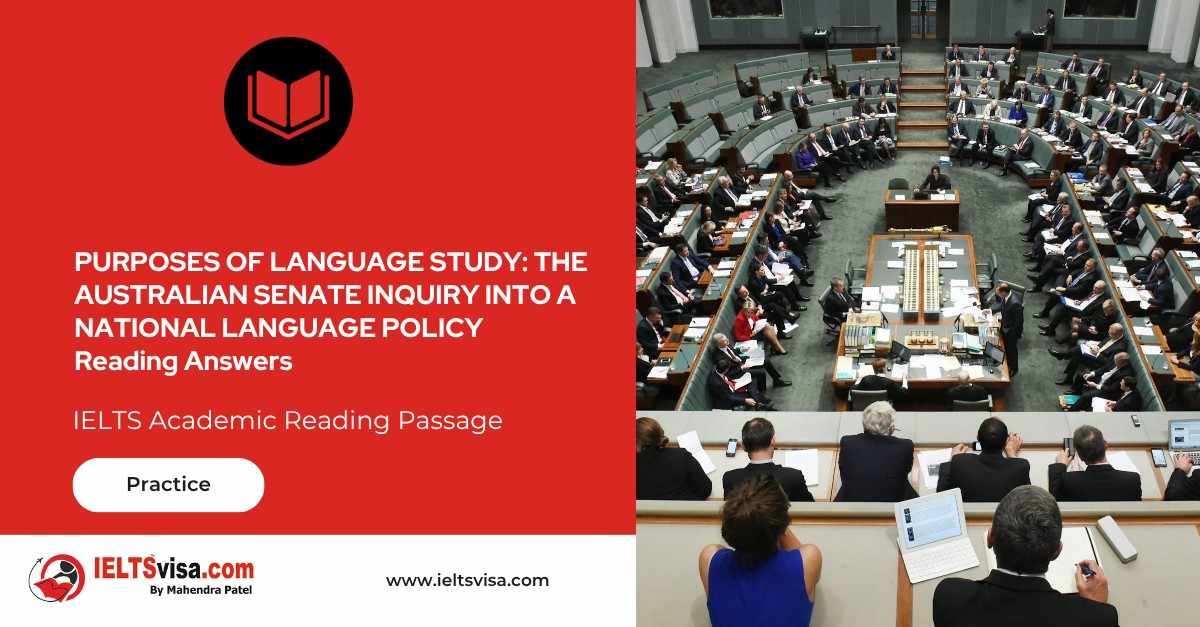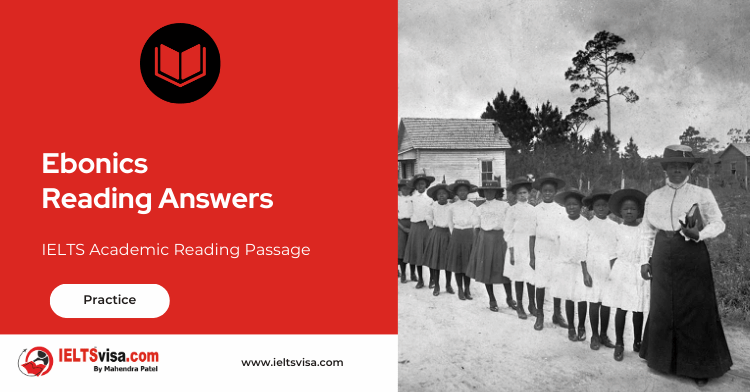PURPOSES OF LANGUAGE STUDY: THE AUSTRALIAN SENATE INQUIRY INTO A NATIONAL LANGUAGE POLICY Reading Answers
IELTS Academic Reading Passage

The Report of the Inquiry by the Senate of the Australian Parliament into a national language policy in Australia proposed 1ve purposes for studying a language other than English in Australian schools.
POINT ONE
The first point relates to what might be termed the more strictly utilitarian reasons for language learning: the acquisition of fluency in a language other than English for the purpose of direct communication. The communication in question may be of an informal nature, such as that which occurs during overseas travel, or between members of different groups within Australian society in a variety of social situations. In large measure, however, this language learning objective relates to the rote of languages other than English in various fields of employment, such as interpreting and translating, international trade, diplomacy and defence.
Professor M. Halliday, a witness to the Inquiry, cautioned against placing too heavy an emphasis on utilitarian goals, stating that ‘one should not be too restricted to the practical arguments which are in a sense dishonest if you say to someone: “If you spend all this time learning a language you will immediately be able to go and find a use for it”.’
The Committee agrees that, taken in isolation, practical arguments tend to give an incomplete picture of the value of language learning. In the early school years, for example, utilitarian objectives may well be less important than they are at tertiary level where employment considerations exert a strong influence.
POINT TWO
The second purpose concerns the link between a language and the cultural context from which it emerges. Many submissions stressed the value of the language learning experience as a means of understanding other cultures, and hence of developing sensitive and tolerant cross-cultural attitudes. This proposition is applied to cultures both within Australia and overseas. Thus, it is argued that language study can contribute in important ways both to harmonious community relationships within Australia, and to an understanding of the cultural values of other countries.
It is also contended that language provides the key to major historical cultures, such as the civilisations of classical antiquity which have exerted a profound influence on the Western tradition.
In the course of hearings, Dr David Ingram of the Australian Federation of Modern Language Teachers Associations referred to evidence which lends some empirical support to the claim that the experience of language learning fosters the development of a better understanding of other cultures. The Committee does not 1nd the proposition difficult to accept. It believes, however, that the measure of success achieved is likely to be largely dependent on the teaching methodology adopted, and the degree of teacher commitment to the goal of cultural awareness and sensitivity.
POINT THREE
The third objective relates to the role of language learning is the maintenance of ethnic languages and cultures within Australia. It was argued in submissions that a central element in Australia’s policy of multiculturalism is a recognition of the value of the cultural heritages of the different groups within Australian society. Since language and culture are inextricably intertwined, the preservation of cultural heritages necessarily entails the retention of the languages associated with them. In the case of Aboriginal communities this issue takes on a special note of urgency since, in many instances, Aboriginal cultures and languages are on the verge of disappearing completely. The objective in this context, therefore, is not simply to assist in the maintenance of a cultural and linguistic heritage but to aid in preserving that heritage from extinction.
POINT FOUR
Prominent amongst the purposes of language learning described in submissions was the fourth point: the development of the general cognitive and linguistic capacities of students. The educational outcomes at stake here were described in a number of ways. Professor M. Halliday, for example, spoke of language learning as an educational exercise of the 1rst importance, as a development of thinking.’ Another submission referred to the development of ‘a sharpened, more critical awareness of the nature and mechanism of language.’ Professor Clyne pointed to research conducted particularly in Canada which, he states, ‘suggests that bilinguals are superior to monolinguals in logical thought and conceptual development, verbal intelligence and divergent thinking.’
POINT FIVE
Finally, several submissions spoke of the role of language learning is the general development of personality. To a large extent, this objective builds upon and sums up aspects of those already covered. The possibility of direct communication with speakers of another language, for example, offers the opportunity for a broadening of personal horizons. A similar outcome may be expected from the encounter with another culture made possible through language study. Where the language concerned is the child’s mother tongue, either the language of a migrant group or an Aboriginal language, an additional factor emerges. In this context, it is argued, language study contributes significantly to the development of individual selfesteem, since the introduction of the language into the school encourages children of that language background to value it and appreciate it as an asset. As a result, their estimation of their family’s value as well as of their own worth is likely to rise.
The Committee believes that submissions have been correct in drawing attention to these personal development issues. Naturally, the benefits of language learning in question here are less easy to quantify than those involved in the objectives previously discussed. Nonetheless, the Committee believes that, if appropriately taught, languages can play an important part in assisting young people to establish their identity, and develop their individual and social personalities.
Questions 28-32
Reading Passage 3 proposes five points for the Purpose of Language Study.
Choose the correct heading for each of the five points from the list of headings below. Write the correct number, i-ix, in boxes 28-32 on your answer sheet.
List of Headings
i Maintenance of ethnic languages and outlines as part of Australia’s policy of multiculturalism
ii Tolerance and acceptance of other races and cultures through language classes
iii Successful communication with non-English speaking people both within Australia and overseas
iv A better appreciation of the multicultural nature of Australian society
v Developing a better understanding of other cultures
vi Developing better cognitive and general linguistic abilities in students
vii Assessment whether bilinguals are superior to monolinguals
viii Developing the personality of students and sense of individual identity
ix The prevention of Aboriginal languages disappearing
28. Point One
29. Point Two
30. Point Three
31. Point Four
32. Point Five
Questions 33–37
Do the following statements agree with the information given in Reading Passage 3?
In boxes 33–37 on your answer sheet, write
-
TRUE if the statement agrees with the information
-
FALSE if the statement contradicts the information
-
NOT GIVEN if there is no information on this
33. Fluency skills in a language other than English are acquired for the purpose of communicating in informal settings.
34. There is evidence which suggests that language learning does not necessarily promote a better understanding of cultures.
35. Learning a second language produces greater tolerance, better understanding of others and acceptance of difference.
36. Preserving a culture involves retaining the language associated with it.
37. Learning a language facilitates a child’s communication with family members of non-English speaking backgrounds.
Questions 38-40
Complete the sentences below. Choose NO MORE THAN TWO WORDS for each answer. Write your answers in boxes 38-40 on your answer sheet.
Understanding of other cultures whether within Australia or overseas is one of the benefits gained through 38
Ability to study one’s background language at school seemingly raises an individual’s 39
Provided they are competently taught, languages can help to form the 40 of individuals and develop their personalities.

Solution For: PURPOSES OF LANGUAGE STUDY: THE AUSTRALIAN SENATE INQUIRY INTO A NATIONAL LANGUAGE POLICY
Reading Answers
| 28 | iii (Point One) |
| 29 | v (Point Two) |
| 30 | i (Point Three) |
| 31 | vi (Point Four) |
| 32 | viii (Point Five) |
| 33 | TRUE |
| 34 | FALSE |
| 35 | NOT GIVEN |
| 36 | TRUE |
| 37 | NOT GIVEN |
| 38 | language learning |
| 39 | selfesteem |
| 40 | identity |
Review and Practice
- Regularly practice with IELTS reading samples and time yourself to get used to the pressure of the exam.
- Review your mistakes to understand where you went wrong and how to avoid similar errors in the future.
Our Books
Master IELTS Speaking Part 1
IELTS Writing Task 1 Book
IELTS Writing Task 2 Book
PURPOSES OF LANGUAGE STUDY: THE AUSTRALIAN SENATE INQUIRY INTO A NATIONAL LANGUAGE POLICY Reading Answers Explanation
Comin Soon
Practice IELTS Other Modules
IELTS Listening
The IELTS Listening test assesses how well you can understand spoken English in various contexts. It lasts about 30 minutes and is divided into four sections with a total of 40 questions. The listening tasks become increasingly difficult as the test progresses.
IELTS Academic Reading
The IELTS Academic Reading section assesses your ability to understand and interpret a variety of texts in academic settings. It is designed to evaluate a range of reading skills, including skimming for gist, reading for main ideas, reading for detail, understanding inferences, and recognizing a writer's opinions and arguments.
IELTS Speaking
The IELTS Speaking test assesses your ability to communicate in English on everyday topics. It lasts 11-14 minutes and consists of three parts: introduction, cue card, and a discussion based on the cue card topic.
IELTS General Reading
IELTS General Reading tests your ability to understand and interpret various types of texts. Here are some key areas and types of content you can expect to encounter in the reading section, along with tips for effective preparation.
IELTS Academic Writing Task 1
In IELTS Academic Writing Task 1, you are presented with a visual representation of information, such as graphs, charts, tables, or diagrams, and you are required to summarize, compare, or explain the data in your own words.
IELTS General Writing Task 1
In IELTS General Writing Task 1, you are required to write a letter based on a given situation. The letter can be formal, semi-formal, or informal, depending on the prompt. Here’s a breakdown of the key components to include in your letter
IELTS Academic Writing Task 2
In IELTS Academic Writing Task 2, you are required to write an essay in response to a question or topic. Here’s a guide to help you understand the essential elements of this task
IELTS Exam Tips
To succeed in the IELTS exam, practice regularly, familiarize yourself with the test format, improve your vocabulary, develop time management skills, and take mock tests to build confidence.
Grammer for IELTS
Grammar is the foundation of effective communication in English. Understanding tense usage, subject-verb agreement, and sentence structure enhances clarity and coherence in writing and speaking.
Vocabulary for IELTS
Vocabulary plays a crucial role in the IELTS (International English Language Testing System) exam, especially in the Speaking and Writing sections. Here’s an overview of why vocabulary is important and how it impacts your performance
RECENT IELTS SAMPLES QUESTIONS AND ANSWERS
Ebonics Reading Answers
A. Ebonics - also known by a host of other names such as African American Vernacular English,...
A Disaster Of Titanic Proportions
A. At 11:39 p.m. on the evening of Sunday, 14 April 1912, lookouts Frederick Fleet and...
Vitamins To supplement or not?
Mineral, vitamin, and antioxidant health supplements make up a multi-billion-dollar industry...
The Hollywood film industry
A. This chapter examines the ‘Golden Age’ of the Hollywood film studio system and explores how...
Three Dimensional Films Reading Answers
A. In the theatre of the Ambassador Hotel in Los Angeles, on the evening of 27 September 1922,...
The Developing World Reading Answers
A THE DEVELOPING WORLD — the economically underdeveloped countries of Asia. Africa. Oceania...













